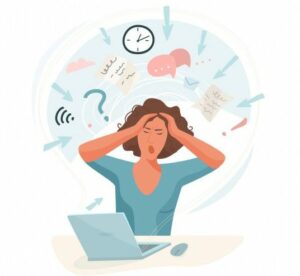Do you have a hard time managing sensory input? Does the sound of people talking make it difficult for you to focus? Do bright lights or loud noises bother you? If so, you may be struggling with overstimulated ADHD. This can be a difficult condition to manage, but there are ways that you can help yourself. In this blog post, we will discuss some strategies that can help you cope with overstimulated ADHD.
Contents
What Does Overstimulated ADHD Mean?
 Overstimulated means that the nervous system is on high alert. This can be due to too many stimuli coming in at once, or because of chronic stress. They may feel anxious, have difficulty concentrating, and be easily distracted when they are overstimulated.
Overstimulated means that the nervous system is on high alert. This can be due to too many stimuli coming in at once, or because of chronic stress. They may feel anxious, have difficulty concentrating, and be easily distracted when they are overstimulated.
For people with ADHD, overstimulation can be a regular occurrence. That’s because ADHD is a neurological condition that affects the way the brain processes information. This can lead to an individual feeling overwhelmed by their environment and struggling to focus on anything.
Overstimulation In ADHD
If you have ADHD, you may be more prone to overstimulation than others. This can make it hard to focus and stay on task. There are a few things you can do to manage sensory input and help reduce overstimulation.
One of the core features of ADHD is inattention. This means that people with ADHD are easily distracted. They may have trouble focusing on one thing for more than a few minutes. Even if they’re not actively trying to pay attention, their mind may wander.
An overstimulated environment can make it even harder for someone with ADHD to focus. Too much noise, light, or movement can be overwhelming and make it difficult to process information. For example, you may be in a meeting at work and find it hard to focus on the discussion because of the fluorescent lights overhead. Or you may be trying to read a book, but the background noise of the TV prevents you from concentrating.
Do People With ADHD Get Easily Overstimulated?
Every day, people with ADHD face overstimulation. We are hypersensitive to both physical and emotional stimuli. This can make it difficult to regulate our emotions and impulsivity, as well as handle big feelings. For some of us, this also manifests in sensory sensitivities where we react strongly to things like sounds, smells, and tastes.
Being around too much noise, for example, can feel like being stabbed in the brain. Or we might have a hard time filtering out background conversations and focusing on the person in front of us. Fluorescent lights can be unbearable, and certain smells can trigger migraines.
For people with ADHD, managing these sensitivities is a daily battle. We have to be constantly aware of our surroundings and how they might be affecting us. This can be exhausting, but there are some things we can do to make it easier.
What Triggers Overstimulated ADHD?

There are a few things that can trigger overstimulated ADHD:
Sensory overload from too much noise, light, or movement: This can happen anywhere, but is especially common in crowded places like malls, amusement parks, or sporting events.
Change in routine: If your child is used to a certain routine and it gets disrupted, that can be a trigger. For example, if you normally eat dinner at home but go out to eat one night, that change in routine can be a trigger.
Stress: stress can be a trigger for anyone, but it can be especially hard for people with ADHD. Things like big projects at school or home, family conflict, or even positive changes like a new baby in the family can be stressful and lead to overstimulation.
Sleep deprivation: One of the most common complaints from parents of children with ADHD.
Many factors can contribute to sleep problems in children with ADHD, including:
- Poor sleep habits
- Sensory processing issues
- Stimulant medication side effects
- Anxiety or depression
Thus these can trigger a child’s fight-or-flight response, making it difficult to fall or stay asleep.
How To Manage Overstimulated ADHD?
To cope with an overstimulated child, it is important to understand how their sensory processing works.
Most children with ADHD are either hypo-sensitive or hypersensitive to certain stimuli.
Hyper-sensitive children are easily overwhelmed by too much stimulation and may become agitated while hypo-sensitive children may seek out more stimulation through fidgeting or moving around.
Here are some tips to help manage an overstimulated child:
- Create a calming environment in their bedroom by using dim lighting and noise-canceling headphones.
- Encourage them to get regular exercise during the day to release excess energy.
- Limit screen time before bed and avoid caffeine late in the day.
- Establish a bedtime routine to help them wind down before sleep.
- Talk to their doctor about possible medication side effects or other underlying conditions that may be causing sleep problems.
With some understanding and patience, you can help your overstimulated child get the rest they need to thrive.
If you find yourself feeling overwhelmed or uncomfortable due to overstimulation, know that it is usually temporary, and removing yourself from the situation can help. Additionally, try tricks that help your brain ignore sensory input so you can avoid overstimulation altogether.
These are some tips through which overstimulation can be reduced:
Take a break: One of the most important things you can do for an overstimulated child is to give them time to rest and recover. This may mean taking a break from school or extracurricular activities for a few days or weeks. It is also important to take breaks throughout the day, especially if your child is having difficulty focusing or seems overwhelmed.
Encourage healthy coping mechanisms: Help your child find healthy ways to cope with their overstimulation. This may include things like regular exercise, journaling, or deep breathing exercises. Avoid using food, TV, or other unhealthy coping mechanisms as a way to deal with overstimulation.
Create structure: A structured environment can help an overstimulated child feel more in control and less overwhelmed. This may mean having a set daily routine or using visual schedules to help them know what to expect each day.
Provide sensory breaks: For children who are hypersensitive to stimuli, it is important to provide regular sensory breaks throughout the day. This may involve things like letting them chew on a favorite toy or taking a walk outside.
With some understanding and patience, you can help your overstimulated child get the rest they need to thrive. By following these tips, you can create a calmer environment for them to live and learn.
Conclusion
It may be concluded that people with overstimulation and ADHD are more sensitive to sensory input. They may have a harder time managing and processing this information. With the right support and guidance, however, they can learn to cope with this difference and lead happy healthy lives.
If you or someone you know struggles with overstimulation or ADHD, there is help available. Talk to your doctor or a mental health professional to get started on the path to managing your symptoms. With the right tools, you can learn to cope with your overstimulation and ADHD and lead a happy, healthy life.
For further information and suggestions, please contact Therapy Mantra. We have a team of expert therapists that can help you overcome this problem. Get in touch with us right away to learn more about our services. You may also make an online therapy session or download our free Android or iOS app.


